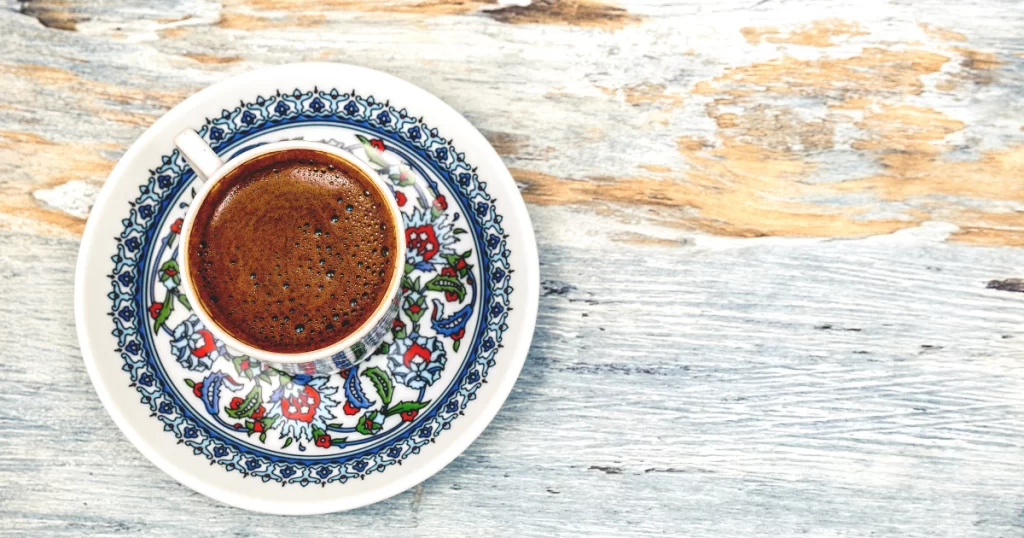Is Turkish Coffee Keto-Friendly? The Mystery Revealed
We have good news for the keto dieters and Turkish coffee lovers among you – yes, it is. In its most traditional preparation, Turkish coffee can easily fit into your low-carb, high-fat diet plan.
In this blog post, I’ll share my experience as someone who went on a successful Keto diet and drinks this type of coffee every day. I would also recommend that you learn about caffeine in Turkish coffee if you are planning to have a few cups each day.
What are the keto diet principles?
The keto diet is all about drastically cutting carbs and increasing healthy fats.
Your daily macronutrient intake should consist of approximately 70-75% fat, 20-25% protein, and only 5-10% carbohydrates.
Keto diet followers often consume coffee as part of their diet. Some people will even sacrifice their 5-10% of carbohydrate intake for the cream in their coffee.
There is also Bulletproof coffee (regular coffee with some kind of healthy fat in it) that helps you to meet your fat intake goals.
As you can see, coffee is absolutely Keto-friendly. But that doesn’t mean you can drink any type and stay in a ketosis state.
Is Turkish coffee keto?
A standard cup of Turkish coffee contains virtually zero carbs, making it a suitable choice for those following a ketogenic lifestyle.
But here’s the catch: you can’t add any sugar to it. Keep in mind that the total carb count can vary depending on the brand. Some pre-packaged
Turkish coffee mixes may contain added sugars or other ingredients, so it’s always a good idea to check the label first.
Turkish coffee nutrients
According to Carb Manager, a 3 oz cup of unsweetened Turkish coffee contains 1 calorie and 0.6 of total carbs, which makes it perfect for your Keto diet.
Benefits of coffee for the Keto diet
Coffee can bring amazing benefits when it comes to the keto diet:
Boosts energy and focus: Coffee contains caffeine, a natural stimulant that can help increase alertness, improve mental focus, and provide a much-needed energy boost. This can be particularly beneficial when following a low-carb diet like keto, as it can help combat any potential fatigue or brain fog that may arise during the initial stages of ketosis.
Enhances fat burning: Coffee has been shown to have thermogenic properties, meaning it can help increase your body’s metabolic rate and promote fat burning.
Antioxidant powerhouse: Coffee is rich in antioxidants, which help protect the body against oxidative stress. This can have long-term health benefits and support overall well-being.

What coffee should you avoid on the Keto diet?
Here are a few to watch out for:
Flavored coffees: These can often contain added sugars, syrups, or artificial sweeteners, which can significantly increase the carbohydrate content.
Sweetened creamers: Many commercial coffee creamers are loaded with sugars, artificial flavors, and unhealthy fats. Consider using unsweetened almond milk, coconut milk, or heavy cream as keto-friendly alternatives.
Frappuccinos and specialty coffee drinks: From caramel drizzles to whipped cream, these indulgent concoctions can easily derail your keto efforts.
Instant coffee mixes: Some instant coffee mixes may contain added sugars or other fillers that can increase the carb content.
Pre-packaged coffee beverages: Be cautious of pre-packaged coffee beverages such as bottled iced coffees or coffee-based energy drinks. These often contain added sugars or artificial sweeteners that can kick you out of ketosis.
In conclusion
Turkish coffee is a great keto-friendly partner on your no-carb journey. In fact, it is a good partner for intermittent fasting also. Just make sure you are not adding any sugar or other sweeteners, and you are good to go.
My journey through renowned bars and coffee shops over five years, as a barista, coffee aficionado, and former bartender, has honed my pursuit for the perfect cup. My passion for coffee isn’t just about the brew—it’s about sharing the knowledge and insights I’ve gleaned along the way.



